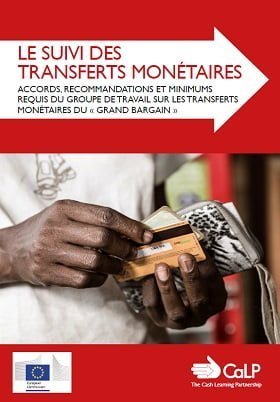Suivi des transferts monétaires
Les signataires du Grand Bargain se sont engagés à accroître leur utilisation des transferts monétaires, et à utiliser des marqueurs communs pour mesurer cette tendance. Bien que le volume de transferts monétaires commence à être suivi plus efficacement, des difficultés techniques et stratégiques persistent. Ces difficultés incluent :
- la définition des données à collecter et de la raison de le faire ;
- l’utilisation constante des catégories de données et des systèmes ;
- la prise en charge des lacunes des systèmes de reporting en place, souvent non conçus pour inclure ou ventiler transferts monétaires, coupons et autres modalités ;
- le passage d’un accord à propos des catégories standard pour le reporting, afin d’éviter toute lacune ou incohérence au niveau des données.
Priorités actuelles
De 2017 à 2019, le CALP Network a co-piloté le chantier auxiliaire du Grand Bargain sur le suivi des transferts monétaires avec la DG ECHO, dans l’optique principalement de convenir d’exigences minimales pour le suivi des transferts monétaires. Ces exigences incluent l’intégration des transferts monétaires dans les principaux systèmes et plateformes de reporting inter-organisations, à savoir le Financial Tracking Service (FTS) de l’OCHA, le module des projets du HPC, la norme relative à l’utilisation des données de l’Initiative internationale pour la transparence de l’aide et le reporting portant sur les 3W (Who does What, Where). Le chantier auxiliaire du Grand Bargain sur le suivi des transferts monétaires a maintenant été fusionné avec le chantier auxiliaire sur l’efficience, l’efficacité et l’optimisation des ressources, que le CALP Network va continuer à co-piloter.
Contenu associé

Tracking Cash & Voucher Assistance Workshop – Part 2: Report
Presentation
Do you want to read the latest on discussions on how to best track cash and voucher assistance in global interagency reporting systems? The CALP Network and ECHO have just released Tracking Cash & Voucher Assistance Workshop – Part 2: Report. Key recommendations emerging from the workshop are summarized below. These will be used in the coming months as a basis to develop guidance for...

Measuring Cash Transfer Programming – Scoping study
Report
This scoping study explores technical and policy issues that are constraining progress towards better measurement and reporting of Cash Transfer Programming (CTP) and addresses these to identify ways forward. The study was developed with the following objectives: • Map and document how different implementing agencies and donors are measuring cash and voucher programming data at the...

Le suivi des transferts monétaires : accords, recommandations et minimums requis du groupe de travail sur les transferts monétaires du « Grand Bargain »
Guides et outils
Ce document comprend les principaux résultats des travaux entrepris par le groupe de travail sur le suivi des transferts monétaires (TM) de 2017 à 2019. Le groupe de travail sur le suivi des transferts monétaires a été créé pour servir de plateforme d’engagement et de prise de décision pour le sous-groupe de travail sur le suivi des transferts monétaires, qui fait partie du groupe...
Thematic lead
Contenu récent
Aucun résultat trouvé
Contenu indisponible actuellement.



